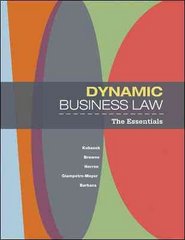Question
Choose the correct answer: 1.In long-run perfect competition, in which situations will a firm necessarily decide to shut down? (Select each correct answer.) a.When total
Choose the correct answer:
1.In long-run perfect competition, in which situations will a firm necessarily decide to shut down?
(Select each correct answer.)
a.When total cost exceeds total revenue
b.When average cost exceeds price
c.When average cost exceeds average revenue
d.When average cost exceeds marginal revenue
2.In long-run perfect competition, firms will continue to enter the market until...
(Select each correct answer.)
a...the demand in the market goes down
b...each firm is producing at its greatest efficiency.
c...the market supply curve becomes perfectly inelastic
d...average cost equals price for each firm in the market
e...average cost is minimized for each firm in the market
f...profits are driven to zero for each firm in the market
3.Suppose a firm exits a competitive market. What happens in the short-run?
(Select each correct answer.)
a.Market quantity increases
b.Market price increases
c.Other firms in the market realize increased profits (or decreased losses)
d.Market demand shifts outward
4.Which of the following are reasons why firm entry and exit might not drive profits to zero for all firms?
(Select each correct answer.)
a.Barriers to entry and exit
b.Excess demand
c.Some firms can produce at a lower minimum average cost, but have capacity constraints
d.Firms exit when economic profits are too low
5.What is unrealistic about the assumption that input prices are fixed?
a.Input prices are often driven to zero by competition
b.Input prices are often determined by a competitive market
c.Firms often minimize the cost of their inputs
d.None of the above
6.If there is a long-run upward-sloping supply curve, then which things are true about the market?
(Select each correct answer.)
a.There must be barriers to entry
b.Input costs must be rising with output
c.Firms must be non-identical
d.It is certain that some firms are capturing rents
e.It is possible, but not certain, that some firms are capturing rents
f.It is certain that all firms are making zero profits
g.It is possible, but not certain, that all firms are making zero profits
7.What is different about a firm's demand for labor in the long run, relative to the short run?
a.In the long run, a firm's demand for labor is perfectly elastic
b.In the long run, a firm's demand for labor is more elastic
c.In the long run, a firm's demand for labor is less elastic
d.In the long run, a firm's demand for labor is higher
e.None of the above
Step by Step Solution
There are 3 Steps involved in it
Step: 1

Get Instant Access to Expert-Tailored Solutions
See step-by-step solutions with expert insights and AI powered tools for academic success
Step: 2

Step: 3

Ace Your Homework with AI
Get the answers you need in no time with our AI-driven, step-by-step assistance
Get Started


